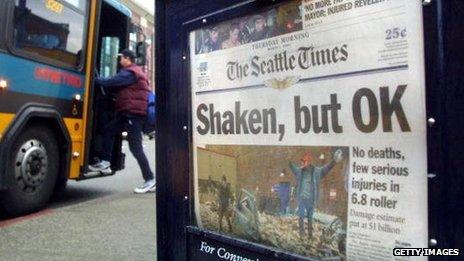Is the internet killing opinion journalism?
- Published
- comments

The Seattle Times continues to provide a forum, both online and in print, for readers to air their views
It's no secret that the internet age has been bad for the print media business in general and newspapers in particular. But what has it meant for the world of opinion? Has the ease with which the average person can share their views with the public been an unmitigated good? Or have we paid a price in the quality of debate?
I put these questions to Kate Riley, external, the editorial page editor of the Seattle Times, one of the more forward-thinking newspaper newsrooms in the US. Here's what she had to say:
I think the Internet age is good for the business of opinion, especially newspaper editorial pages - um, make that media opinion enterprises. We all, after all, are in transition and are figuring out how the business model transforms.
There are the trolls, of course, who throw mud in the comment sections of every published article - not so useful.
But where I really think that opinion pages are making a difference is in modelling that old-school civil discourse. Disagree but don't be disagreeable. Be tart and clever without name-calling. Especially because of the mission of newspapers serving a general community's readership, not just those of a certain ideology, readers can stretch their own thinking on issues by reading pro and con columns side-by-side.
People often call me to complain about running too many conservative columnists or too many liberal, and I explain that is the role of our opinion section and part of its mission statement: to be a forum for community dialogue and learning. I promise each caller that they will find things they agree with on our pages and things they don't agree with. And that's the point.
Readers/viewers/users - or whatever you want to call them - have an appetite for opinion. Editorial pages can cater to that and provide opinion content in many different ways. We do chats often, and we recently ran our second Google Hangout around campaign finance issues during the lunch hour. Last year, we enlisted readers through social media to advance the same-sex marriage issue - and received 315 photos, representing more than 1,000 people.
A popular feature, Civil Disagreement, between one of our most liberal writers and our most conservative, thoughtfully, respectfully hashes out issues of the day.
First rule? No ideological talking points.
At The Seattle Times, we have much more opinion content online than in print, and I've come to view the printed page as the best of our online content, whether it's a letter worth highlighting or a blog post to be excerpted.
Around the US, newspapers and purveyors of opinion are grappling with the challenges of the internet and social media. Establish writers are having to adapt, and new voices are being revealed. I'll ask them what they think the futures holds and share their take with Echo Chambers readers.